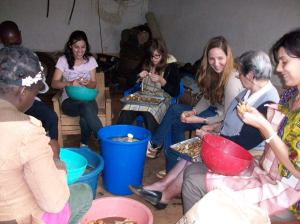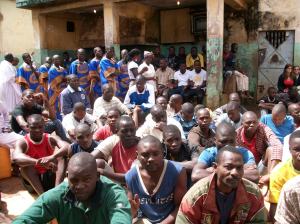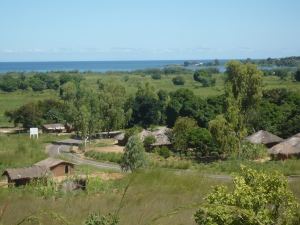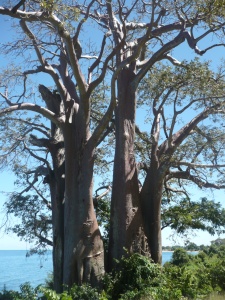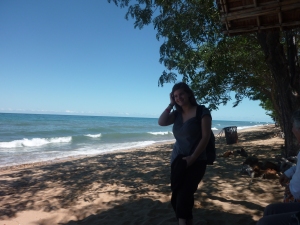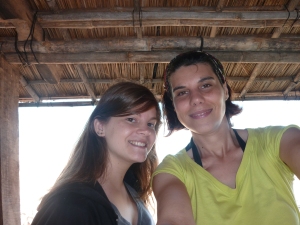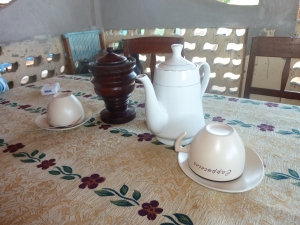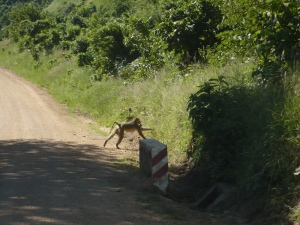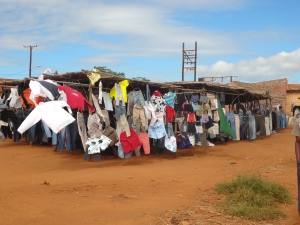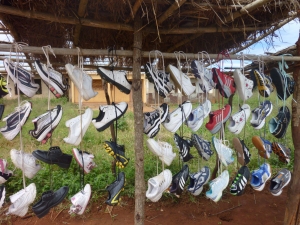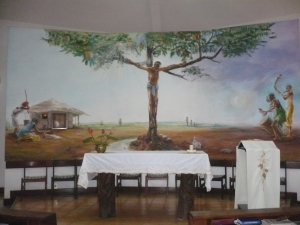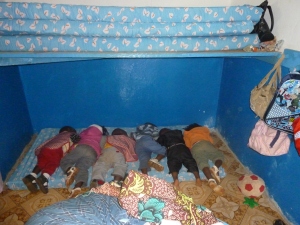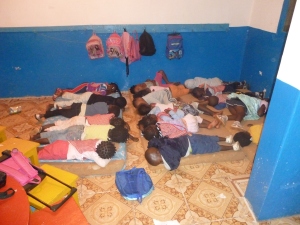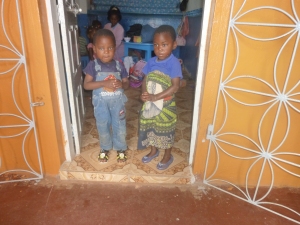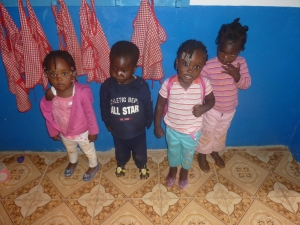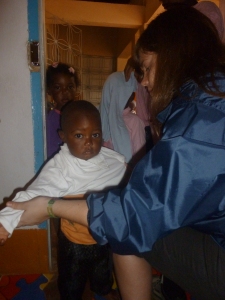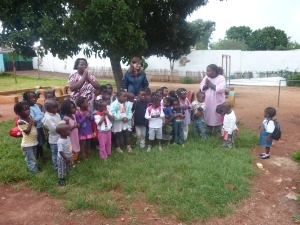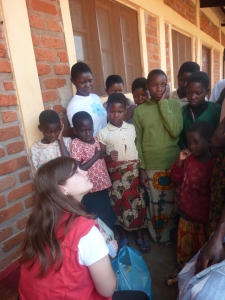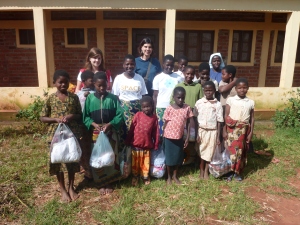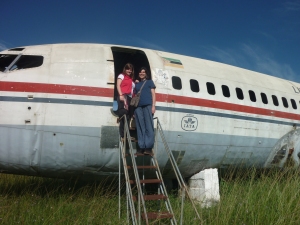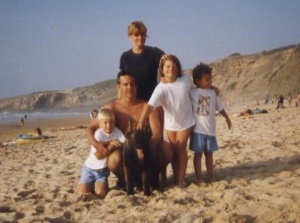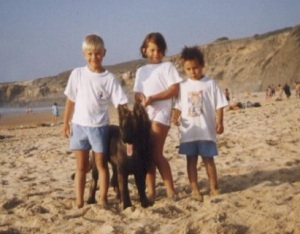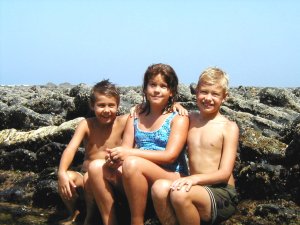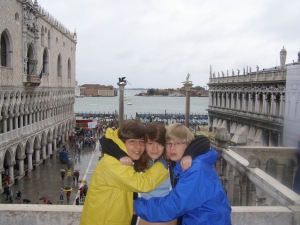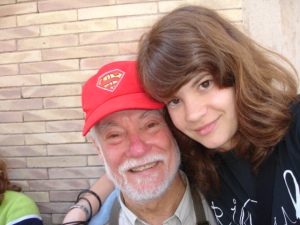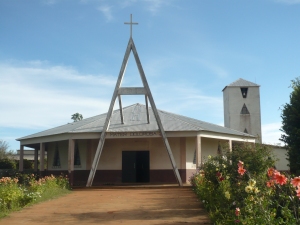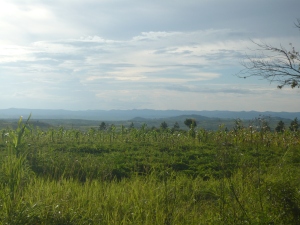Para quem ainda não sabe, já estou de regresso a Portugal. A minha intenção original era ficar em Lichinga durante 12 meses, mas como os meus avós faziam 50 anos de casados dia 23 de Abril, eu decidi voltar mais cedo e surpreendê-los. Mas antes de falar sobre essa surpresa, vou escrever sobre os últimos dias que passei em Moçambique.
Depois de eu e a Catarina termos dado as roupas aos meninos da escolinha do Sorriso e às meninas órfãs do Mosteiro, entrámos na semana de Páscoa. Fomos à celebração do lava-pés na Quinta-feira Santa, na sexta-feira foi a Via Sacra e no Domingo de manhã fomos à missa de Páscoa. O nosso almoço de Páscoa foi bem diferente ao que estou acostumada: tínhamos na mesa pizza e frango assado com batatas fritas em vez de leitão e cabrito.
Durante essa semana continuei a trabalhar no secretariado e na escolinha, preparando a próxima revista no primeiro e ajudando a organizar o dossier das inscrições dos meninos na segunda.
Na sexta-feira, dia 13 de Abril, eu e a Catarina fomos ajudar a irmã Lourdes e a irmã Blandina a descascar batatas para o almoço dos presos que se iria realizar no dia seguinte. Também foram ajudar as outras leigas que trabalham na escolinha da irmã Ferreira, outra Catarina e a Patrícia:
Então, no dia seguinte, lá fomos nós até à prisão, para assistir à celebração da Páscoa que se iria lá realizar, tendo em conta que não poderíamos ficar para o almoço. Aqui está uma fotografia dos prisioneiros sentados, durante a celebração:
Fui muito tocante a visita à prisão, pois os presos passam lá muita fome, muitos são leprosos, tuberculosos e têm SIDA… é mesmo impressionante. Muitos dos que lá estão já terminaram a sua sentença, mas nem sabem e também ninguém lhes diz, por isso continuam lá injustamente. Já para não falar que as condições são péssimas.
A 15 de Abril, o último Domingo que passaria em Moçambique, eu, a Catarina, o Zé e a Ana fomos passear até ao Lago Niassa. Eu tencionava tomar banho, mas estava muito vento e muitas ondas, fazendo com que a temperatura não fosse das mais agradáveis. Então estivemos apenas a apanhar banhos de sol.
Aqui esta uma fotografia da paisagem do lago:
Uma de um embondeiro bastante peculiar:
Uma minha no lago, tirada pela Catarina:
E outra de nós as duas:
Depois fomos almoçar (eles comeram peixe e eu comi frango) e a Catarina tirou-nos uma fotografia, a mim, à Ana e ao Zé, enquanto estávamos à mesa:
Perguntámos se eles tinham café e eles disseram que sim, então a Catarina e a Ana pediram dois cafés. Passado um bocado apareceu o senhor do restaurante a dizer que o café estava dentro do armazém e que o senhor que tem a chave não estava, mas que eles já tinham entrado em contacto com ele para ele vir trazer a chave, e que portanto o café já vinha. Entretanto trouxeram as chávenas, o bule com água e o açúcar:
Mais tarde voltaram a dizer que, afinal, não tinham café! Isto é mesmo para rir!
A nossa visita ao Lago acabou em grande: até os babuínos e os macacos vieram despedir-se de mim! Uma família inteira de babuínos atravessou a estrada quando íamos a passar. Nesta fotografia apanhei um deles, porque eles vinham um de cada vez, não todos ao mesmo tempo:
E apanhámos, também, uns macaquinhos a comer à beira da estrada:
Na terça-feira, dia 17 de Abril, eu, as outras duas Catarinas e a Patrícia fomos até ao mercado de Chiuaula, o maior mercado ali de Lichinga, ou, pelo menos, dos que eu conheço. Aqui estão algumas fotografias de roupas, calçado e sacos de plástico em exposição no mercado:
Na quarta-feira de manhã fui até à escolinha, para me despedir dos monitores e das cozinheiras. E dos meninos também, claro. Depois almocei com as irmãs teresianas, mas apenas com a irmã Maria José e a irmã Tecla, pois a irmã Carolina encontrava-se em Maputo a tratar do seu passaporte e a irmã Juliana estava em Marrupa (se não me engano). Ofereceram-me uma taça e uma caixa em pau-preto, que eu gostei muito e já tenho ali no meu quarto a enfeitar.
Depois fui até casa das irmãs doroteias, para dar os parabéns à irmã Ferreira, que fazia 82 anos naquele dia. A irmã Lourdes também me ofereceu uma pulseira em pau-preto, que eu também tenho guardada ao pé das prendas que as irmãs teresianas me deram. Lanchei em casa das irmãs doroteias, com a Catarina, a Ana e o Zé, onde comemos os morangos da irmã Ferreira, que são muito bons. Ou seja, quarta-feira foi um dia em que estive muito ocupada e sempre fora de casa; o que me valeu foi já ter a mala feita!
Na quinta-feira de manhã despedi-me de todos lá em casa (Aíde, Rosa; do Meni despedi-me no dia antes, porque ele estava de férias) e depois vieram levar-me ao aeroporto o irmão José, a irmã Maria José, a Catarina, a Ana e o Zé. Do Dom Elio já me tinha despedido no Sábado anterior, pois ele foi para Maputo nesse dia (acabei por voltar a encontrar-me com ele em Maputo, quando lá estive). Enquanto estávamos no aeroporto à espera da hora de embarque, apareceu a irmã Ferreira com uma taça de morangos para mim. Foi um momento bastante inesperado e comovente, não estava mesmo nada à espera que uma velhotinha de 82 anos fosse ao aeroporto de propósito levar-me uma taça dos melhores morangos do mundo. Foi um momento muito bonito.
Cheguei a Maputo e o padre Ruffini foi buscar-me ao aeroporto. Comecei a sentir-me um bocado constipada e cansada, então fui descansar um pouco.
No dia seguinte (20 de Abril) acordei às 6h da manhã para ir com o padre Abel ao seminário, ao encontro episcopal, onde estava o Dom Elio e onde se iria celebrar uma missa às 8h. Aproveitei para me despedir do Dom Elio, apesar de não me estar a sentir muito bem: estava constipada e sentia que tinha febre.
Antes de chegarmos ao seminário, o padre Abel levou-me a conhecer a casa dos padres dehonianos na Matola. Lá havia uma capela que tinha uma pintura muito bonita:
Depois lá fomos para o seminário, onde estive a conversar com o Dom Elio e onde foi a celebração. Aproveitei para tirar uma última fotografia com o Bispo de Lichinga:
Quando cheguei a casa fui logo almoçar e depois deitar-me, pois, apesar de ter tomado um comprimido, continuava a não sentir-me bem. Fui controlando a febre e vi que estava a aumentar. Comecei também a sentir-me fraca e com tremores, então liguei para a irmã Aila, que me disse que eu estava com malária. Eu pensei “que pontaria, um dia antes de apanhar o avião para me ir embora!”. Ela receitou-me uns comprimidos e fui até à farmácia com o padre Abel comprá-los. Regressei a casa e a febre atingiu os 39,5ºC e continuava a tremer e sem forças. Tomei logo os comprimidos e pus uma toalha com água fria na cabeça. Na hora do jantar senti-me melhor, mas depois voltei a piorar. Foi uma noite bastante complicada, essa noite. Não sei como, mas no dia seguinte acordei a sentir-me muito melhor (apesar de ainda estar muito fraca); devia ser a vontade de regressar para casa, apesar de já estar com saudades de Moçambique, sem ainda me ter ido embora.
De manhã fui ao hospital de umas irmãs (cuja congregação já não me lembro qual era, mas elas eram espanholas), para fazer o teste da malária. Quem me fez o teste foi a irmã Estrela. Este deu negativo, pois eu já estava a tomar os comprimidos para me curar, portanto seria quase impossível dar positivo.
Uma amiga da Catarina, Orlanda, foi muito simpática e veio visitar-me antes de eu ir para o aeroporto. Gostei muito de a conhecer e de falar com ela, apesar de ter sido apenas durante uns 15 minutos. Foi muito agradável.
Despedi-me dos padres dehonianos e o padre Ruffini veio levar-me ao aeroporto. Lá tive problemas com a minha bagagem de mão, pois pesava quase o dobro do permitido pela LAM, e com a minha bagagem de porão, pois tinha artesanato em pau-preto. Fui logo chamada para dizer o que tinha lá e os trabalhadores que controlam a bagagem começaram a meter-se comigo e a dizer para irmos beber um café juntos. Eu disse que tinha de me ir embora, então dei-lhes 100 meticais (o equivalente a cerca de 2,70 euros) e pedi-lhes o meu passaporte de volta. Lá me deixaram ir e embarquei.
A viagem foi muito longa, pois de Maputo a Joanesburgo o voo teve a duração de apenas uma hora, mas depois estive em Joanesburgo cerca de 5 horas à espera do voo seguinte. O que vale é que no primeiro voo conheci um rapaz chamado Hélio, que ia apanhar o mesmo voo que eu em Joanesburgo, então estivemos no aeroporto a conversar e a ver o jogo do Barcelona – Real Madrid. O voo seguinte foi o mais longo, de Joanesburgo para Amesterdão, que durou cerca de 11 horas. Estive duas horas no aeroporto de Amesterdão, onde aproveitei logo para comprar uma mala da Kipling e para conversar com a senhora da loja (estou a ficar como a minha avó…), e, por fim, apanhei o último avião, para Lisboa.
For those who don’t know already, I’m back in Portugal. My original intention was to stay in Lichinga for 12 months, but, as my grandparents were celebrating their 50th marriage anniversary on April 23rd, I decided to go back earlier and surprise them. But, before talking about that surprise, I’m writing about the last days I spent in Mozambique.
After giving the clothes to the kids in the kindergarten and to the orphan girls at the Monastery, we entered the Easter week. Catarina and I went to the foot-washing celebration on the Holy Thursday, on Friday we had the Way of the Cross and on Sunday morning we went to the Easter celebration. Our Easter lunch was quite different than I’m used to: we had pizza and roast chicken with fries on the table, instead of pig and goat.
During that week I kept on working in the secretariat, preparing the next magazine, and at the kindergarten, organizing the files.
On Friday, April 13th, Catarina and I went to the dorothean’s house to help them peel potatoes for the prisoners’ Easter lunch, which was happening on the next day. The other girls, Catarina and Patrícia, also went there to help:
So, on the next day, we went to the prison, to attend to the Easter’s celebration, since we couldn’t be in the lunch. Here it is a picture of the prisoners, during the celebration:
The visit to the prison was very touching, because the prisoners there are very hungry, a lot of them have got AIDS, leprosy and tuberculosis… it’s really impressive. Some of them have finished their sentence, but they don’t even know and also nobody tells them, so they keep on being there unfairly. Not to mention that the conditions are very poor.
On April 15th, the last Sunday I would spend in Mozambique, Catarina, Zé, Ana and I went to the Lake Niassa (also known as Lake Malawi). I intended to bathe in the lake, but it was really windy, making the temperature a little unpleasant. So we simply stayed there, sunbathing.
Here it is a picture of the lake’s landscape:
A picture of a really peculiar baobab:
A picture of me in the lake, taken by Catarina:
And another one of the two of us:
Then we had lunch (they ate fish and I ate roast chicken) and Catarina took a picture of me, Ana and Zé, while we were sitting at the table:
We asked them if they had coffee and they said yes, so Catarina and Ana asked for two coffees. A few minutes later the waiter comes back and says that the coffee was inside of the storage and that the man who had the key was not there at that moment, but that they had already called him and he was on his way with the key, so the coffee was also on its way. In the meantime he brought the teacups, the teapot with water and the sugar:
Later on the waiter came back saying that they didn’t have any coffee after all! This made us all laugh (and leave).
Our visit to the lake finished big time: even the baboons and monkeys came to say goodbye to me! An entire baboon family crossed the road right when we were driving through. In this picture I caught one of them, because they only came one at a time:
We also caught some little monkeys eating by the edge of the road:
On Tuesday, April 17th, the three Catarinas and Patrícia went to the Chiuaula’s market, the biggest one in Lichinga, at least that I know of. Here are a few pictures of clothes, shoes and plastic bags exposed in the market:
On Wednesday morning I went to the kindergarten, so that I could say goodbye to the monitors and the cooks. And to the children too, of course. Then I had lunch with the teresian sisters, but only with sister Maria José and sister Tecla, since sister Carolina was in Maputo taking care of her passport and sister Juliana was in Marrupa (I guess). They got me a bowl and a box made of blackwood, which I really liked and they’re already in my room.
Then I went to the dorothean sister’s house, so that I could wish sister Ferreira a happy birthday, because it was her 82nd anniversary that day. Sister Lourdes also gave me a bracelet made of blackwood, which I also have saved next to the other pieces the other sisters gave me. I had tea there with the dorothean sisters, Catarina, Ana and Zé and we ate sister Ferreira’s strawberries, which are very very good. So Wednesday was a really busy day for me, since I spent most of the time away from home; good thing I had already packed my stuff!
On Thursday morning I said goodbye to everyone in the house (Aíde, Rosa; I said goodbye to Meni the day before, because he was on holidays) and then, to the airport with me, came brother José, sister Maria José, Catarina, Ana and Zé. I had already said goodbye to Dom Elio on Saturday, because he went to Maputo on that day (I ended up meeting him there again, when I was there). While we were at the airport waiting for the time to board, sister Ferreira came by with a bowl of strawberries for me. It was an unexpected and touching moment, because I didn’t think an 82 year-old lady would go to the airport just to bring me the best strawberries in the world. It was a beautiful moment.
I arrived in Maputo and father Ruffini picked me up at the airport. I started feeling a little bit constipated and tired, so I had to go home and rest for a bit.
On the next day (April 20th) I woke up at 6 a.m. to go with father Abel to the seminar, to the Episcopal meeting, where Dom Elio was at and where a celebration was happening at 8 a.m. I took the chance to say one last goodbye to Dom Elio, even though I wasn’t feeling that well: I had a cold and felt that I had a fever.
Before arriving to the seminar, father Abel took me to the dehonians’ house in Matola. There was a chapel there which had a very beautiful painting:
Then we went to the seminar, where I spent a little time talking with Dom Elio and then we went to the celebration. I took the chance to take on last picture with the Bishop of Lichinga:
When I got home I had lunch right away and then went to bed, because, even though I had taken a pill, I wasn’t feeling very well. I was always checking my fever and it was always rising. I also started feeling week and started trembling, so I called sister Aila, who told me I had malarya. I thought “nice shot, a day before catching the plane to leave!”. She prescribed me a few pills and then I went to the pharmacy with father Abel to buy them. I got back home and the fever reached the 39,5ºC and I was still trembling and weak. I took the pills right away and put a wet towel in my head. By dinner time I was already feeling better, but then I got worse again. I had a tough night, that night. I don’t know how, but on the next day I woke up feeling a lot better (even though I was still very weak); it must have been the will to go back home, even though I was already missing Mozambique, without having left.
In the morning I went to some sisters’ hospital (I can’t remember their congregation, but they were spanish), to take the malarya test. It was sister Estrela who did me the test. The result was negative, because I was already taking the pills to cure myself, so it was almost impossible to get a positive result.
A friend of Catarina’s, Orlanda, was really nice and came to visit me before I left to the airport. I really liked meeting her and talking to her, even if it was just for 15 minutes. It was really good.
I said goodbye to the dehonian fathers and then father Ruffini took me to the airport. There I had problems with my hand luggage, because it was too heavy, and with my checked luggage, because I had things made of blackwood there. I was called to say what I had in my bag right away and then the workers started asking me out for coffee. I said I had to leave and then I had to pay them 100 meticais (around 2,70 euros) so that they would give me my passport back and let me leave. They did and then I went to the airplane.
The journey was too long, because the flight from Maputo to Johannesburg only took one hour, but then I had to stay at Johannesburg’s airport for 5 hours, waiting for my next flight. Fortunately I met a young man named Hélio on the first flight, who was also taking the same flight as me (from Johannesburg to Amsterdam), so we stayed there together talking and watching the Barcelona – Real Madrid match. The next flight was the longest one, it took around 11 hours. Then I stayed in Amsterdam’s airport for two hours, where I took the chance to buy a Kipling handbag and to talk with the lady who worked at the Kipling store (I’m starting to resemble my grandma…), and then I finally took my last flight, to Lisbon.
Na semana de 19 a 23 de Março, passei algum tempo com a Catarina, uma voluntária portuguesa que está a viver em casa das irmãs doroteias, e contei-lhe que tinha roupa, material escolar e ainda algum dinheiro (tudo daquele dinheiro que me tinha sido enviado pela equipa de casais dos meus pais para o Cobué, mas que já não iria para o Cobué, sendo que, então, eu ainda estava a decidir o que fazer com tudo o que comprei); ela disse-me que a escolinha do Sorriso estava sempre a precisar de roupa para os meninos e que eu devia falar com a irmã Blandina (das doroteias) sobre isso. Disse-me, também, que a irmã Lourdes (também das doroteias) estava a organizar um almoço de Páscoa para os presos da prisão de Lichinga e que, para isso, estava a angariar dinheiro para comprar os alimentos necessários. Como ainda me tinha sobrado algum dinheiro, decidi dá-lo à irmã Lourdes, para ela comprar um cabrito para esse almoço de Páscoa. Ela ficou toda contente e muito agradecida.
Entretanto, fui também falar com a irmã Blandina, que me disse que, ainda no dia anterior (21 de Março), a tia Rita (directora da escolinha do Sorriso) lhe tinha dito que estavam a precisar urgentemente de roupa e que, assim, foi muito bom eu ter aparecido ali, de repente, com tanta roupa para dar. Disse-me que eu podia ir, assim que pudesse, lá à escolinha levar o que tenho e agradeceu-me muito.
Fiquei muito contente por poder ajudar esta escolinha e por poder contribuir para o almoço dos presos, que passam muita fome naquela prisão.
Um dia depois do aniversário do meu irmão e do meu avô, fui a uma vigília dos jovens das três paróquias de Lichinga (Catedral, Nzinje e Cerâmica), preparada pela irmã Maria José e pela irmã Lourdes. A Catarina também veio a esse encontro, que começou às 20h30 de Sábado e terminou por volta das 5h de Domingo. Estivemos a cantar, a ver o filme “A Paixão de Cristo” e a cear chá, pão e bolachas (que têm um nome engraçado, Maning Naiss, que aqui significa “muito bom”. Alguma semelhança entre este “naiss” e o “nice” inglês é pura coincidência… ou então não! Eles aqui dizem muito “nice”. Abaixo está uma fotografia do pacote das bolachas:)
Depois da ceia, os jovens estiveram a trabalhar em grupos, para preparar a Via Sacra, onde todos participámos a seguir. A vigília terminou com uma missa.
Na segunda-feira, dia 26 de Março, eu e a Catarina fomos à escolinha do Sorriso levar a roupa e os sapatos que eu tinha comprado (com o dinheiro da equipa de casais dos meus pais). A tia Rita e as outras titias ficaram muito contentes e agradecidas. Aqui está uma fotografia da tia Rita (à esquerda) e de uma das titias (à direita) a segurar alguns dos sacos que trouxemos:
Quando lá chegámos, os meninos ainda estavam a dormir, por isso ainda não podíamos ver se os sapatos e as roupas lhes serviam:
Mas, assim que acordaram, foram surpreendidos com sapatos e roupa novos:
Aqui está uma fotografia da Catarina com dois meninos, depois de terem experimentado roupa nova:
De seguida, a tia Rita juntou os meninos quase todos para nos cantarem uma música, como forma de agradecimento. A Catarina filmou e, nesse vídeo, eles agradecem à “tia Ana”, que é a minha mãe, pois a tia Rita pediu-me para lhe dizer um nome a quem eles pudessem agradecer, então disse o da minha mãe, como representante de toda a equipa de casais:
Tirou-nos, também, uma fotografia, a mim, às titias e aos meninos:
Fomos embora com a sensação de missão cumprida. Fiquei mesmo muito feliz por poder ajudar estes meninos.
Durante o resto desta semana não pude ir à escolinha de Nzinje, pois estive doente, tendo optado por passar mais tempo em casa a recuperar. Também passei no secretariado, para trabalhar numas coisas.
No Sábado, dia 31 de Março, o irmão José levou-nos, a mim e à Catarina, até ao Mosteiro, para levar umas roupas, calçado e material escolar às meninas órfãs que são lá acolhidas pelas irmãs.
Elas ficaram muito contentes por nos ver, tendo-nos cumprimentado todas com um “passou-bem”. Aqui está uma fotografia minha a entregar-lhes um dos sacos de roupa:
E outra fotografia minha a mostrar-lhes o que estava dentro do saco do material escolar:
Antes de irmos embora, o irmão José tirou-nos uma fotografia, a mim, à Catarina, a uma das irmãs do Mosteiro e às meninas:
A caminho de casa, o irmão José ofereceu-se para nos levar a passear à Translândia (os meus leitores assíduos já sabem a que me estou a referir), onde estivemos a ver os cavalos e o conhecido avião do Papa:
Assim se passou mais uma semana aqui em Lichinga, e muito bem.
On the week from 19th to 23rd of March, I spent some time with Catarina, a portuguese volunteer who is living in the dorothean sisters’ house, and I told her that I had clothes, school supplies and still some money (all of that came from that money that was sent by my parents’ team of couples for Cobué, but that it wasn’t going to Cobué anymore, so I was still deciding what to do with everything that I had bought); she told me that the Sorriso (portuguese word for “Smile”) kindergarten was always needing new clothes for the children and that I should speak with sister Blandina (from the dorothean) about that. She also told me that sister Lourdes (also from the dorothean) was organizing an Easter lunch for the prisoners that were in Lichinga’s jail, and that she was collecting money to buy the foods. As I still had some money left, I decided to give it to sister Lourdes, so that she could buy a goat for that Easter lunch. She was really happy and thankful for that.
In the meantime, I also had a word with sister Blandina, who told me that, on the day before (March 21st), Rita (the Sorriso kindergarten’s director) had told her that they urgently needed clothes for the kids and that it was great that I suddenly showed up there, with those clothes to give. She told me that I could go to the kindergarten, as soon as I was able to, to give them what I have and thanked me a lot.
I was really happy to be able to help this kindergarten and to be able to contribute for the prisoners’ lunch, who really starve in that prison.
A day after my brother’s and grandparent’s birthday, I went to a vigil for the youngsters of the three parishes in Lichinga (Catedral, Nzinje and Cerâmica), which was prepared by sister Maria José and sister Lourdes. Catarina also went to that meeting, which started at 8:30 p.m. on Saturday and ended around 5 a.m. on Sunday. We sang, watched the movie “The Passion Of The Christ” and had supper: tea, bread and cookies (which have a funny name, Maning Naiss, that here means “very good”. Any resemblance between this “naiss” and the english “nice” is pure coincidence… or not! Here they say “nice” quite often. Below is a picture of the cookies’ package:)
After the supper, the youngsters worked in groups, to prepare the Way of the Cross, in which all of us took part of after. The vigil ended with a celebration.
On Monday, March 26th, Catarina and I went to the Sorriso kindergarten to give them the clothes and the shoes I had bought (with the money my parents’ team of couples had given me). Rita and the other women that worked there were really happy and thankful. Here it is a picture of Rita (on the left) and one of the workers (on the right) holding some of the bags of clothes we brought:
When we got there, the kids were still asleep, so we couldn’t see if the clothes and shoes fit:
But as soon as they woke up, they were surprised with new shoes and clothes:
Here it is a picture of Catarina with two kids, after they tried their clothes on:
Right after, Rita gathered the kids around, so that they could sing us a song together, as a way of thanking us. Catarina filmed it and, on that video, they thank to “tia Ana” (aunt Ana), who is my mother, because Rita asked me to tell her a name they could thank to, so I told her my mother’s, she being the team of couples representative:
She also took us, the kids, the workers and I, a picture:
We left with that mission accomplished feeling. I was really happy to have been able to help these kids.
For the rest of the week I wasn’t able to go to Nzinje’s kindergarten, because I was sick, so I opted to spend more time at home and recover. I also went to the secretariat, to work on a few things.
On Saturday, March 31st, brother José took Catarina and I to the Monastery, so that we could bring there some clothes, school supplies and shoes to the orphan girls who live there, with the sisters.
They were really happy to see us, giving us a handshake as a compliment. Here it is a picture of me giving them one of the bags of clothes:
And another picture of me showing them what was inside of the school supplies bag:
Before we left, brother José took a picture of me, Catarina, one of the sisters and the girls:
On the way home, brother José offered to take us to Translândia (my frequent readers know what I’m referring to), where we saw the horses and the well-known Pope’s plane:
And that’s how one more week passed here in Lichinga, and a good one it was.
O meu irmão Miguel faz hoje 18 anos. É com muita pena minha que não estou presente no seu 18º aniversário, mas festejo aqui, sozinha, como se estivesse aí com todos vocês. E é motivo para festejar, porque há 9 anos e 11 meses não sabíamos se alguma vez iríamos celebrar os seus 18 anos de vida.
Há 10 anos atrás, o meu irmão era um menino bem-disposto e traquinas. Quem olhava para ele, ficava contagiado com a sua felicidade e ninguém imaginava que iria acontecer o que aconteceu.
Dia 30 de Abril de 2002, há 10 anos, praticamente, foi-lhe diagnosticado um tumor cerebral. Este é um dos tipos de situações que sabemos que existem e que são graves, mas achamos sempre que só acontecem aos outros. Foi um grande choque para a nossa família e amigos, que mudou as nossas vidas por completo e para sempre, desde aquele momento em que nos disseram que ele estava a fazer uma hidrocefalia e que precisava de ser operado com urgência.
No dia seguinte, entrou para o bloco operatório, enquanto eu e o nosso irmão João Pedro estávamos na escola. Tínhamos apenas 12 e 9 anos, respectivamente. À tarde, depois das aulas, fomos visitar o Miguel ao hospital. Com aquela idade ainda não sabíamos muito bem o que se estava a passar, mas lembro-me que me custou muito olhar para o meu irmãozinho mais novo e ver que estava deitado numa cama, de cabelo rapado, branco como a cal e com um alto na cabeça. Fiquei tão impressionada na altura, que ainda hoje é impossível tirar essa imagem da cabeça.
Felizmente, houve várias coisas que nele nunca desapareceram e que nos ajudaram a todos a superar o pior momento das nossas vidas: o seu sorriso, a sua força de vontade, a sua coragem, a sua paciência, o seu bom humor, a sua fé, a sua esperança e a sua capacidade de aceitar as situações mais complicadas, como se de nada se tratassem… O Miguel já não era bem-disposto e traquinas, mas era a criança mais corajosa e forte que eu alguma vez conheci… Sendo mais novo do que eu, é o meu herói. Sempre que tenho algum problema insignificante, lembro-me de como superou o maior problema que teve na sua vida e que afectou as vidas de todos os que o amam.
Eu nem quero imaginar como seria a minha vida, a nossa vida, se o Miguel não tivesse sido forte como foi, não tivesse lutado como lutou e não tivesse encarado esta situação da forma como encarou. Nunca se questionou porque é que isto lhe tinha acontecido; nunca, por um momento, pensou em desistir; nunca se queixou de dores nem de mau estar… Acima de tudo, nunca perdeu a fé.
Tenho tanto orgulho no meu irmão e no jovem que ele se tornou, dos sonhos que concretizou, da forma como continua a encarar determinadas situações na sua vida, nunca se aproveitando da sua condição, que o tornou no jovem especial, alegre, lutador, corajoso, bem-disposto, maduro, forte… E estou muito feliz que ele faça parte da minha vida, da nossa vida, pois ensinou-nos tantas, mas tantas coisas, que ele nem imagina, nem nunca imaginará.
Miguel, és um milagre. És o nosso milagre. E és o meu herói e a minha maior inspiração.
A tua irmã,
Catarina Ramalheira Ferreira
Ficam aqui algumas fotografias. A primeira é a fotografia de família, antes de o Miguel ficar doente. O cão é o Wally, que por coincidência faz anos no mesmo dia que o Miguel. As seguintes fotografias são minhas e dos meus irmãos: o loiro é o João Pedro, o moreno é o Miguel.
Aproveito para desejar, também, um feliz aniversário ao meu avô, que, há 18 anos atrás, teve a sua melhor prenda de anos de sempre: o meu irmão. Desde então, sempre disse que o Miguel era a sua prendinha. O meu irmão nasceu um mês antes do tempo e calhou nascer precisamente no dia de anos do meu avô. Coincidência? Não há coincidências. Nada acontece por acaso, tudo acontece por uma razão.
Hoje posso dizer, com toda a certeza, que o Miguel não é apenas a prendinha do avô; é a prendinha de todos nós. A sua vida é a maior prenda que todos nós poderíamos ter. Um verdadeiro milagre.
O meu avô e o meu irmão, para além de terem nascido no mesmo dia, são também duas das pessoas que mais me inspiram e por quem mais sinto orgulho. A forma como vivem a sua vida e como lidam com o seu dia-a-dia é absolutamente extraordinária. Eles sim, sabem viver. Porque, como diz o meu avô, não é difícil saber viver, é difícil é saber viver. E eles sabem viver, que é uma das muitas coisas que estou a tentar aprender com eles.
Eu e o meu avô, Alberto Ramalheira:
Today it’s my brother Miguel’s 18th birthday. And I am very, truly sorry for not being there celebrating his 18th birthday, but I celebrate here, by myself, as if I was there with all of you. And it’s reason to celebrate, because 9 years and 11 months ago we didn’t know if we would ever be celebrating his 18 years of life.
Ten years ago, my brother was a cheerful, prankster little boy. Everyone who looked at him would be automatically infected by his happiness and nobody imagined that what happened would happen.
On April 30th 2002, practically 10 years ago, he was diagnosed with a brain tumor. This is exactly that kind of situation which we know that can happen, that it exists and that is serious, but we think it only happens to others. It was a huge shock for our family and friends, that completely and forever changed our lives, from that moment we were told he was making a hydrocephalus and that an urgent surgery was urgently needed.
On the next day, he got into the operating room, while our brother João Pedro and I were in school. We were only 9 and 12 years old, respectively. In the afternoon, after classes, we went to the hospital to visit Miguel. At that age we didn’t really know what was going on, but I remember walking in that room and looking at my little brother, lying in a hospital bed, without hair, excessively white and with a kind of bump on the head. I was really impressed by that at the time, that even today it’s impossible for me to get that image out of my head.
Fortunately, there are several things that didn’t disappear in my brother and that helped us all to get through the worst moment in our lives: his smile, his willpower, his courage, his patience, his good humor, his faith, his hope and his capacity of accepting the most complicated situations, as if they were nothing… Miguel wasn’t that cheerful, prankster little boy anymore, but he was the bravest and strongest child I have ever met… And being younger than me, he’s still my hero. Every time I have this insignificant problem, I think about how he overcame the biggest problem he had in his life and that affected the lives of all the people who love him.
I can’t even imagine how my life, our lives, would be if Miguel hadn’t been strong as he was, hadn’t fought as he fought and hadn’t faced this situation the way he did. He never wondered why this was happening to him; he never, not for a single moment, thought about giving up; he never complained of pain or malaise… And, above that all, he never, ever, lost his faith.
I am so proud of my brother and of the young man he became to be, of the dreams he had that came true, of the way he keeps facing certain situations in his life and never taking advantage of his situation, which made him the special, cheerful, fighter, brave, joyful, mature, strong young man he became… And I am so happy to have him in my life, in our lives, because he taught us so many things, that he can’t even, or ever will, imagine.
Miguel, you are a miracle. You are our miracle. And you’re my hero and my biggest inspiration.
Your sister,
Catarina Ramalheira Ferreira
Here there are a few pictures. The first one is the family picture, before Miguel got sick. The dog is Wally, which birthday is also on the same day as Miguel’s. The following pictures are my brothers and mine: the blond one is João Pedro and the brown haired one is Miguel.
I take the chance to also wish my grandpa a happy birthday, who, 18 years ago, had his best birthday gift ever: my brother. Since then, he’s been calling Miguel his “little gift”. My brother was born a month before he was supposed to, and on my grandpa’s birthday. Coincidence? There are no coincidences. Everything happens for a reason.
Today I can clearly say that Miguel is not just grandpa’s “little gift”; he’s everybody’s “little gift”. His life is the biggest gift that all of us could have. A true miracle.
My grandpa and my brother, besides being born on the same day, are also two of the people that most inspire me and who I feel most proud of. The way they live their lives and they way they deal with things everyday is absolutely extraordinary. They do know how to live. Because, as my grandpa says, it’s not hard to live, but it is indeed hard to know how to live. And they know how to live, which is one of the things I’ve been trying to learn from them.
My grandpa, Alberto Ramalheira, and I:
Hoje celebra-se o Dia Internacional da Mulher, porque, em 1910, na Dinamarca, foi decidido homenagear-se as mulheres que, a 8 de Março de 1857, entraram em greve numa fábrica de têxteis em Nova Iorque, pois trabalhavam 16 horas por dia e recebiam menos de um terço do salário dos homens. Nessa noite foi declarado um incêndio na fábrica e cerca de 130 mulheres morreram queimadas. É por esta razão que se comemora o Dia Internacional da Mulher; para relembrar a importância do papel e da dignidade da mulher e para contestar e rever preconceitos e limitações que têm vindo a ser impostos à mulher em todo o Mundo, e já por muitos séculos.
Compreendo porque se celebra este dia, o que não significa que seja totalmente a favor: acho que não deveria ser preciso um dia para relembrar o mundo do papel e da dignidade da mulher; a mulher é mulher todos os dias, não apenas um dia por ano, e, por isso mesmo, o seu papel, dignidade, valores, direitos deviam ser relembrados todos os dias do ano, e não apenas num.
Aproveito o Dia Internacional da Mulher para falar na realidade onde estou inserida neste momento: aqui em Moçambique celebra-se o Dia da Mulher Moçambicana a 7 de Abril (daqui a um mês estarão as mulheres daqui a celebrar). A típica mulher moçambicana acorda de manhã cedo, vai tratar da sua machamba, regressa a casa para tomar conta dos filhos, tratar da casa e fazer as refeições; quando o marido chega a casa, também trata dele, fazendo-lhe tudo o que lhe pede; muitas vezes, é agredida pelo marido (que muitas das vezes chega a casa embriagado) e quando alguém lhe diz que tem de ir reportar à polícia, responde “não vou, porque é tradição (ser agredida pelo marido)”. Todo o ano, a vida da mulher moçambicana (não estou a generalizar, estou a falar da mulher típica) é esta. Excepto no Dia da Mulher Moçambicana: neste dia, ou seja, um dia por ano, a mulher pode fazer tudo o que lhe vier à cabeça. Neste dia, a mulher pode não trabalhar na machamba, não tratar dos filhos, sair à rua sem capulana, embriagar-se, festejar, bater no marido e, até mesmo, matar o marido (o que muitas fazem, pois são agredidas todo o ano e acabam por ficar fartas e “explodir” – atenção, nada justifica a agressão, muito menos o homicídio), que não é julgada pelas autoridades. Neste dia, os maridos fogem das mulheres, com medo.
Ou seja, as mulheres moçambicanas têm um dia para gozar da liberdade que não gozam durante todo o ano (obviamente que continuo a não concordar com os homicídios).
Isto para dizer que celebramos o Dia Internacional da Mulher para relembrar os direitos das mulheres, mas a verdade é que a igualdade de género ainda está longe de se concretizar, um pouco por todo o Mundo, infelizmente.
Today is celebrated the International Women’s Day, because, in 1910, in Denmark, it was decided to pay tribute to the women who, on March 8th 1857, went on strike at a textile factory, in New York, for working 16 hours a day and being paid less than a third of what the men were paid. On that night it was declared a fire on the factory and about 130 women were burned to death. That is why the International Women’s Day is celebrated; to recall the importance of women’s role and dignity and to contest and review prejudices and limitations that have been imposed on women all over the World, and for so many centuries.
I understand why this day is celebrated, but that doesn’t mean that I am totally in favor: I don’t think it should be needed a day to remember the world of women’s role and dignity; a woman is a woman every day, not just a day per year and, for that reason, her role, dignity, values, rights should be recalled every day of the year, not just in one.
I take this opportunity of talking about International Women’s Day to talk about the reality where I am inserted right now: here in Mozambique, on April 7th, it’s celebrated the Mozambican Women’s Day (in a month, women here will be celebrating). The typical mozambican women wakes up early, takes care of the “machamba”, comes back home, watches over the kids, takes care of the house and cooks the meals; when the husband gets home she also takes care of him, doing everything he asks her; most of the times, he beats her up (who, most of the times, arrives drunk) and when someone tells her to report the physical aggression to the police, she answers “I won’t, because it’s tradition (being beat up by the husband)”. All year, the mozambican women’s life is like that (I’m not saying all the women live like that, I’m just talking about the typical one). Except on Mozambican Women’s Day: on that day, that is once a year, women can do everything that comes to their heads. On that day, women may choose not to take care of the “machamba”, not to watch over the kids, go out without wearing the typical clothes, get drunk, party, beat up their husbands, and even kill them (a lot of them kill their husbands, because they can’t stand being beaten up every day anymore, so they “explode” – attention, nothing justifies violence, much less homicide), because they won’t be judged by the authorities. On that day, husbands are afraid of their wives.
That is, the mozambican women only have one day to enjoy their freedom for an entire year (obviously that I keep on not agreeing with the homicides).
I’m saying this to show that we celebrate the International Women’s Day to recall the women’s rights, but the truth is that gender equality is far from becoming a reality, everywhere around the World, unfortunately.
No Sábado à tarde, dia 3 de Março, fui com o irmão José até ao Mosteiro Mater Dolorosa, para fazermos um favor que a irmã Maria José nos pediu: falar com as irmãs do Mosteiro e pedir-lhes emprestados uns livros de português, pois a irmã Maria José agora dá aulas na Universidade Católica de Moçambique – Extensão Lichinga.
A caminho do Mosteiro, apanhei um enorme susto: o capim está grande, por causa das chuvas, então uma criança, de cerca de 4 anos, apareceu de repente, vinda do capim, metendo-se mesmo à frente do carro; mais 2 segundos e tinha sido atropelada e eu tinha tido um ataque cardíaco. É um perigo as crianças andarem sozinhas ao pé de estradas onde passam carros, principalmente porque não foram ensinadas a olhar para um lado e para outro, para ver se vem algum.
Chegando ao Mosteiro, e depois do susto, aproveitei para tirar umas fotografias da paisagem, que é muito bonita, mas que não se vê bem nas fotografias, pois as plantações de milho estão muito altas, dificultando a visibilidade da paisagem mais longínqua.
Ontem eu, o Dom Elio e o irmão fomos almoçar a casa das irmãs da Cerâmica, que têm sempre sobremesas muito boas. A irmã Albertina pediu-me que fosse ver um dos computadores, que estava sem Internet. Depois de lhes resolver o problema, eu, o Bispo e o irmão José regressámos a casa.
E é tudo por hoje.
On Saturday afternoon, March 3rd, brother José and I went to the Monastery Mater Dolorosa, to do sister Maria José a favor she asked us: talk with the sisters from the Monastery and ask them to lend her some portuguese books, because sister Maria José is now a teacher in Mozambique’s Catholic University, in Lichinga.
On the way to the Monastery, something really scared me: the grass is high, because of the rain season, so a little boy, who was probably four, showed up out of nowhere, coming from the grass, and got right in front of the car; two seconds more and we would have ran over that kid and I would have had a heart attack. It’s really dangerous for the kids being out there alone near the roads, especially because they weren’t taught to look both ways and see if a car is coming.
When we got to the Monastery, after that scare, I took the chance to take a few pictures of the landscape, which is beautiful, but unfortunately we can’t see it that well on the pictures, because the cornfields are too high, making it difficult to see the further landspace.
Yesterday Dom Elio, brother José and I had lunch at the Cerâmica’s sisters’ house, where there are always nice desserts. Sister Albertina asked me to fix a problem in one of their computers, because it had no Internet. After solving the problem, we got back home.
And it’s all for today.

